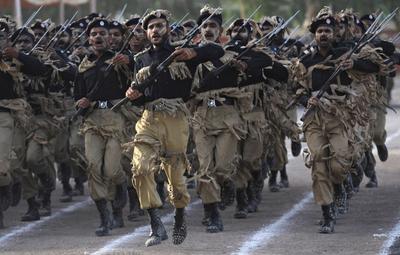It has become, unexpectedly perhaps, a defining moment for Barack Obama and the first term of his Presidency. For another, the killing took place on Pakistani soil so it vastly complicates relations between the United States and Pakistan. This has already unleashed a round of violence — the ‘first revenge for Osama’s martyrdom’ — with the detonation of two bombs in Shabqadar in north-west Pakistan near Afghanistan as military recruits boarded buses after 10 days leave from a training course.
Raza Agha and Mohsin Khan raise, in this week’s lead essay, many questions about Bin Laden’s death and the manner of his killing in Pakistan.
Americans are asking how it is that the most wanted terrorist in the world could have hidden ‘in plain sight’ in Pakistan for five to six years. Either the military, and in particular the Inter Services Intelligence agency (ISI), must have known of his presence, in which case the government of Pakistan was complicit in hiding him. Or the government and the ISI did not know, in which case they were incompetent. But the question that troubles Pakistani officials and the public more is how the US operation itself could have gone completely undetected. From a Pakistani perspective, either the military and the ISI were complicit, in this conception with the US, or incompetent and incapable of protecting the sovereignty of their country. These questions will be pored over by Americans and Pakistanis for some time. President Obama said on 8 May, that Bin Laden had some type of support network inside Pakistan, although it is not known whether he had the support of the government or the military. Presumably in time the answer to this question will emerge, and hopefully it will be made public as well.
Agha and Khan argue that it ‘strains credulity that “Operation Neptune Spear” could have taken place without any Pakistani assistance. After all, US helicopters flew from their base in Jalalabad in Afghanistan to Abbottabad, some 250 kilometres away inside Pakistan, flying over some of the most militarised areas in the country. The Pakistanis claim that the Bin Laden compound had been investigated previously by the ISI and that they had shared information about it with the US since 2009. US officials dispute that contention, claiming they did not know of the Bin Laden compound until last August. Finally, the CIA rented a house near the Bin Laden compound for surveillance, and it is logical to conclude that at least some Pakistani authorities had known that this had been done and why.’
If there was cooperation, the Pakistani government could well be complicit in the story that US forces carried the operation out by themselves. The Pakistanis have every reason to be shy about revealing any role they may have had in facilitating Bin Laden’s death, in the same way that they publicly condemn US drone attacks on Pakistani targets as a violation of sovereignty and look the other way. The Tehreek-e-Taliban Pakistan (TTP), the organisation responsible for the most daring assassinations, suicide attacks and militant operations within Pakistan, as Agha and Khan accurately forecast, will now focus on the Pakistan government, perhaps including a targeting of its political leaders.
These developments have two major consequences for Pakistan, one damaging and one with the promise of some upside.
On the downside, it opens up the threat of a cut to the substantial aid the US extends to Pakistan just as the elevation of security anxieties puts added strain on a struggling Pakistani economy. But given the likely alternatives, it would be very unwise for the US to withdraw its support for Pakistan’s secular and duly elected government, extremely difficult though its task of governing might be.
On the upside, the questioning of the role of the ISI and the military in Pakistan has already had the effect of strengthening support for civilian control over the security and military. As Agha and Khan observe, ‘it is highly unusual in a democratic society to have the main intelligence service report to the military and not to the elected government.’ The civilian government is now under intense pressure to do something about this. And regaining its international and domestic reputation, ironically, will force the Pakistani military to take the fight up to the extremist groups operating inside Pakistan and in the border areas between Pakistan and Afghanistan, a response that could strengthen national cohesion when national cohesion is so sorely needed.
Peter Drysdale


The relationship between Pakistan and the US is far from ideal and it would be no surprise if evidence were revealed about the links between bin Laden and the government of Pakistan. The fights between military and civilian leaders are still present in the country and so the possibility to cooperate with terrorists is clearly there.
US-Pak relations have hit a new low
It is no longer a question of tweaking or nuancing the relationship. The strategic interests of the two countries just do not converge.converge.